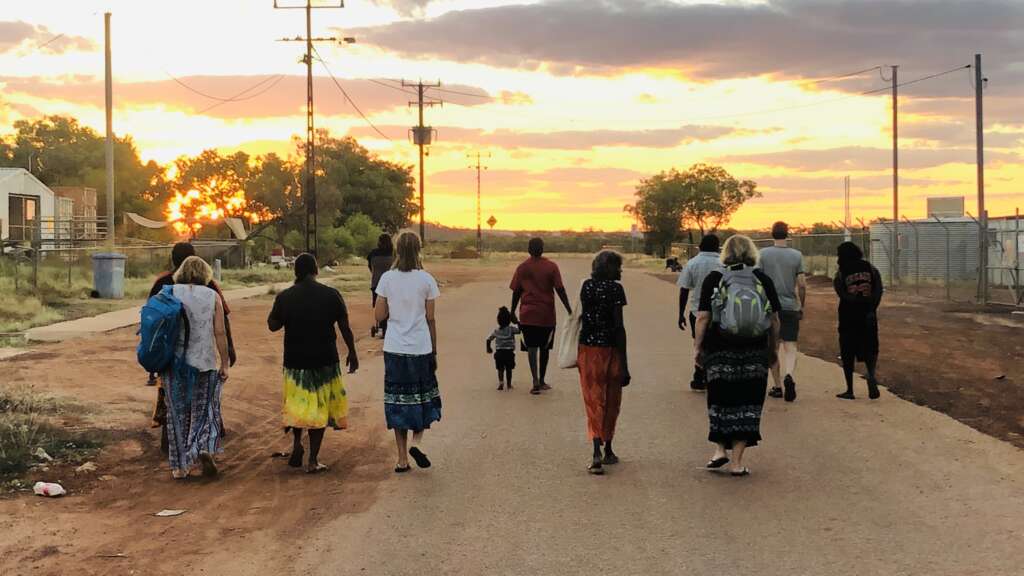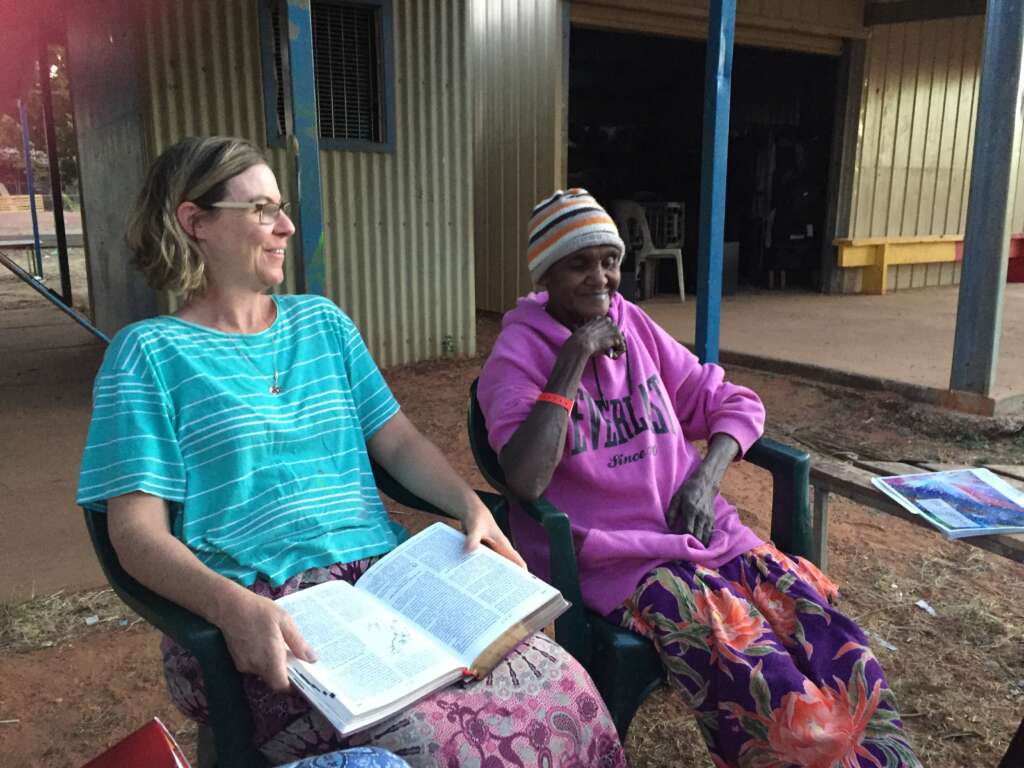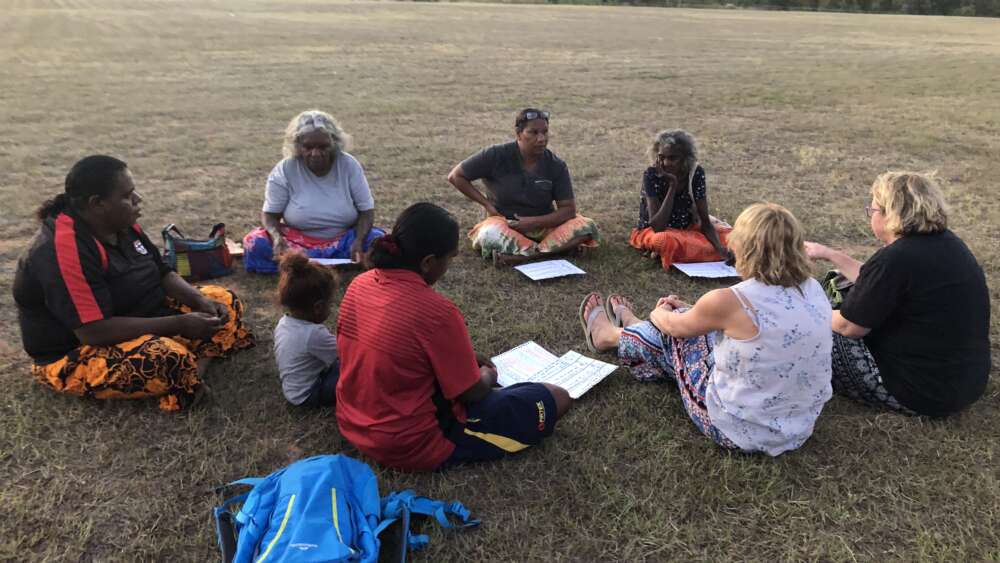A profound expression of gospel unity has developed between the members of St Barnabas Anglican church in Minyerri, in the Northern Territory, and Bobbin Head Anglican Church (BHAC) on Sydney’s north shore, according to Luke Woodhouse, senior minister at BHAC.
When Luke started at BHAC in 2015, he inherited a partnership with Minyerri that had been formalised in August 2014 at the invitation of its then deacon, Darryn Farrell, after BHAC members had made several visits to the community.
“Since that time, we’ve been a visiting Minyerri twice a year as a church, once usually at the beginning of the dry and once towards the end of the dry season,” says Luke.
Now, after COVID forced cancellations in 2020 and 2021, the church is excited to be planning its first trip to Minyerri for almost three years at the end of June-beginning of July.

Bobbin Head visit to Minyerri
The team from Bobbin Head Anglican sees its partnership with Minyerri as one of mutual support and encouragement as disciples of Jesus. They consciously avoid an agenda of doing projects. They enter each visit in the awareness that they will be the ones learning and growing during their time together with the Minyerri church.
“At its simplest, I would hope from the Minyerri perspective, the partnership is Christian sisters and brothers praying for each other, committed to a deep and genuine relationship, to see regular visits from sisters and brothers all the way from Sydney, who have been praying regularly, encouraging the Christians in Minyerri to press on as followers of Jesus.
“We learn a huge amount about our own cultural lenses of the gospel.” – Luke Woodhouse
“And that’s expressed by visiting twice a year. Some would say that’s a lot and others would say it’s not enough. From our perspective, we learn a huge amount about our own cultural lenses of the gospel and what are the things that we do that are just because of the way that we are and what are the essentials to Christian fellowship. And we were sharpened in that. Having a week where we have our members genuinely ask other members of the church, ‘do you think I could sit and read the Bible in Kriol with you and you could explain what it means?’ – is mutually beneficial because they obviously have the knowledge of Kriol and often far closer cultural connections to various parts of the text.
“Me doing that as a pastor with just four or five other members from our church twice a year is a huge blessing for our church community as we sit and think through what disciple-making looks like in another culture.”
Luke says that even asking what things they should be praying for the Christians in Minyerri is a really “sharpening” question.
“It really feels to me a lot like the ending of a lot of Paul’s letters, how he does all those personal greetings and he’s expressing his affection and partnership with the church in this place and that place. It feels a little bit like that with the church in Minyerri and the church in Sydney and their genuine interest in the gospel, how people are going in trusting Jesus.”

Hanging out together at Minyerri, south of Katherine in the NT
Luke explains that, because the church building and the Christian fellowship in Minyerri is in the open-air (not inside a building) non-church-going people in the community “see that there’s a bunch of ‘whitefellas’ from out of town that aren’t fixing something or running a sports camp or a program, they’re just hanging out…. it’s quite counter-cultural for the community.”
He says that while there are other secular organisations possibly involved in something on the surface similar to their partnership, what BHAC are involved in is not driven by the more secular narrative of reconciliation. Rather it stems from something that has always been there in those who share in the Christian gospel which is clearly expressed in New Testament letters such as Romans, Ephesians and Galatians.
“It’s almost like our equivalent of the Jew-Gentile division, which would have just been so counter-cultural in the first century to have a Jew and a Greek sitting down and having deep, rich fellowship together,” he says.
“To have a north shore, predominantly white Anglo people sitting down and breaking bread and having fellowship with the Christians in Minyerri is an expression of a far richer and far deeper reconciliation than any of the more secular narratives that we often hear.
“I steer away from the word reconciliation in describing the nature and backdrop of our partnership, not because I’m against it, but because the word is loaded and people can read into it all kinds of current political debates – whereas what I think we are involved in is something quite different, far more profound, a gospel unity and a genuine expression of sharing together as the family of God from every tribe, tongue, language and race.”
“To have a north shore, predominantly white Anglo people sitting down and breaking bread and having fellowship with the Christians in Minyerri is an expression of a far richer and far deeper reconciliation.” – Luke Woodhouse
Luke, who is a Beatles fan, likens this to what happens when he meets another Beatles fan in a random place and feels an automatic bond with them.
“What you see experienced by the BHAC team is we go in and because we both love Jesus, you experience this immediate connection, despite not even being able to really communicate clearly as you’d like. And you feel it – you’re not manufacturing it, you’re not trying to create reconciliation – you just know and experience that there is a reconciliation already in Christ, rather than something that has to be created.”
He says this is expressed beautifully when the Sydney mob sits down with the Minyerri mob to write songs together in Kriol – an activity they really love.
“So we write songs that we sing together and even just talking through what should the lyrics be? ‘How do we say that in Kriol?’ The first one we wrote was about Jesus feeding the 5,000. I remember discussing ‘what is it that Jesus gives, this special food?’; and we were talking through, ‘what is the food that really lasts?’ and just that process of us talking through what should the lyrics of our song be was really unifying and encouraging.
“Even though our language was different and how we express things is different, we both knew we wanted to say the same things. We want to say the gifts Jesus gives us are something more than physical bread. And that was quite amazing. And there was just a unity that existed because of Jesus and it started expressing itself.”
Luke is looking forward to the resumption of regular visits to Minyerri from Bobbin Head Anglican because the regularity emphasises that the Minyerri Christians are not alone – they’re part of the bigger body of Christ.
Email This Story
Why not send this to a friend?




